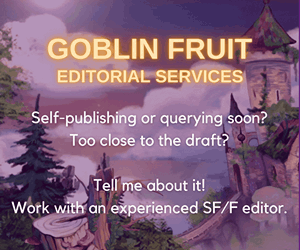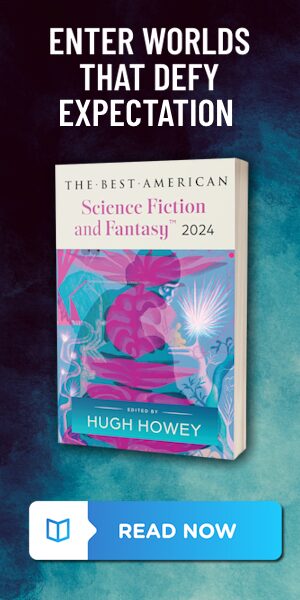In your story, “Bear and Shifty,” Roger and Bear survive on the edge of civilization, fencing what supplies they can steal while avoiding capture by an alien race. Given the range of settings for this story, how did you settle on a Southwest desert?
I did settle on the Southwest. Before the conscious choice, I had more of a visual image of the setting as one that was inhospitable to human inhabitants, a setting for Westerns. While the story does not go into it deeply, I wanted canyon lands and cacti, deserts and dry pines—a setting that I imagined could be generally inhospitable to both aliens and humans, and one in which growing one’s own food was a difficult proposition, (thus allowing them more of a motivation for behind-the-lines raids into enemy territory).
With the aliens and humans vying for territory and supplies, there’s a palpable tension and a sense of inevitable conflict, yet the history of this conflict is only hinted at. Could you give us a bit more of the backstory of the enmity between the humans and aliens?
Sure—when I was imagining this world, I really liked the idea of an invading alien force that was technologically superior to us, but had made numerous vital mistakes about the terrain and their enemy along the way. That—like, really, all wars—the war they waged had grown long and complicated, with infinite loose ends that never seem to quite wrap up. Even as they’ve become the dominant force on the planet, they cannot quite manage the insurgents, and years of attempts have only brought about years of increasingly sophisticated resistance. If you look at the Mayan resistance against the Spanish, it’s incredible how many uprisings there were over hundreds of years. In this world, I imagined that a series of quick victories might allow the aliens massive domination, and an endlessly drawn-out latter half of the war.
The rich history of human vs. alien stories is incredibly vast. From where did you draw inspiration for this story?
This story started out as a character sketch. I was interested in drawing a sort of antithesis to the stereotypical Western-novel cowboy, a character-type that has often carried over to alien/space stories as well. Bear is jovial and fat, loves to eat and is regularly, persistently wrong. He’s emotional and warm, and yet he can kick some serious ass—though he prefers not to have to—when it comes down to it. He’s damaged goods, and it gives him a kind of invincibility.
Preston’s unfortunate predicament as a dual brings to mind visions of MK-Ultra and worse using advanced technology. Considering the exceptional reliance that humans have on technology, and that it increases more each year, do you see a danger that technology could expand to alter conscious thought?
I think technology already alters and dulls conscious thought, in so many ways. One of my favorite books of the last few years has been Feed by MT Anderson—in which, essentially, we all have an ad-sponsored version of the Internet embedded in our brains as well as a group-think chat-channel. While not explicitly altering conscious thought, this certainly hugely represses/alters it. We also have many chemicals that repress or enhance various parts of our chemical makeup, and I think all of these have an effect on conscious thought. Extrapolating from this, I think it’s only a matter of time before technology is more completely integrated into our brains to alter and enhance, as well to provide utter escapism from, conscious thought.
On a lighter note—Sweet Os and garbanzo beans seem to be a staple part of available food in this story. If you had to survive in the borderlands and had to choose three types of canned or boxed food, what would be on your wish list?
Garbanzo beans would be high up there, I think. This is a tricky question probably better served by a nutritionist, but for me, I’d try my best to pick three items that had distinctly different tastes—say: salty, sweet, sour—and which came close to being a balanced diet. Maybe canned peaches, garbanzo beans, and something crunchy. I recently had blue corn chips with chia seeds in them, just . . . wow.
Finally, do you have any new projects you’d like to announce?
My next novel, Sherwood Nation, is forthcoming from Small Beer Press in 2013. I’m currently working on a futuristic, Arctic-based novel I’m co-writing with the writer David Naimon. We’re hugely further along than I’d ever suspected we’d make it co-writing the thing, and odds are looking most excellent on the completion of that one early next year.
Enjoyed this article? Consider supporting us via one of the following methods:










